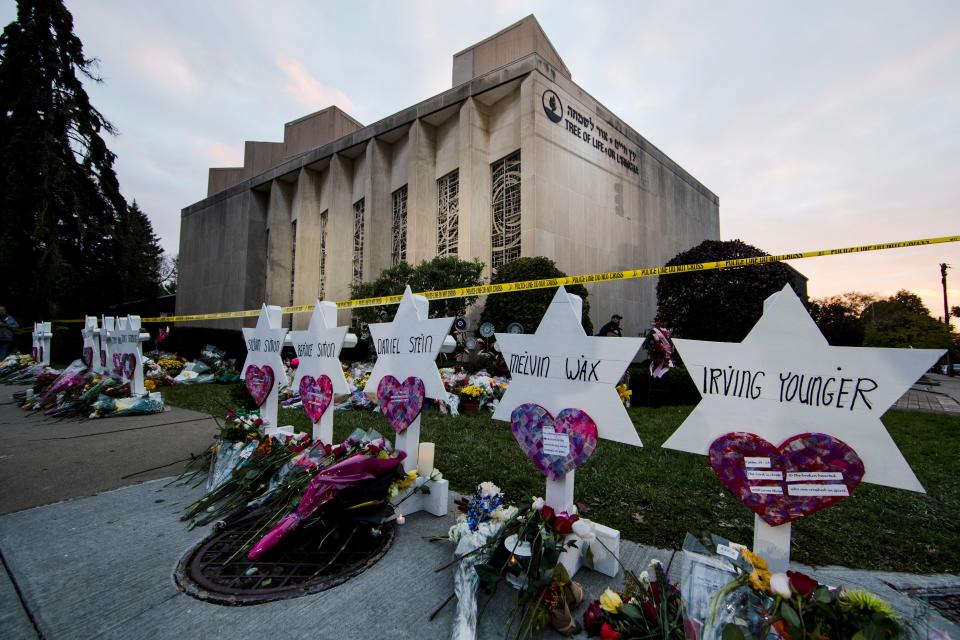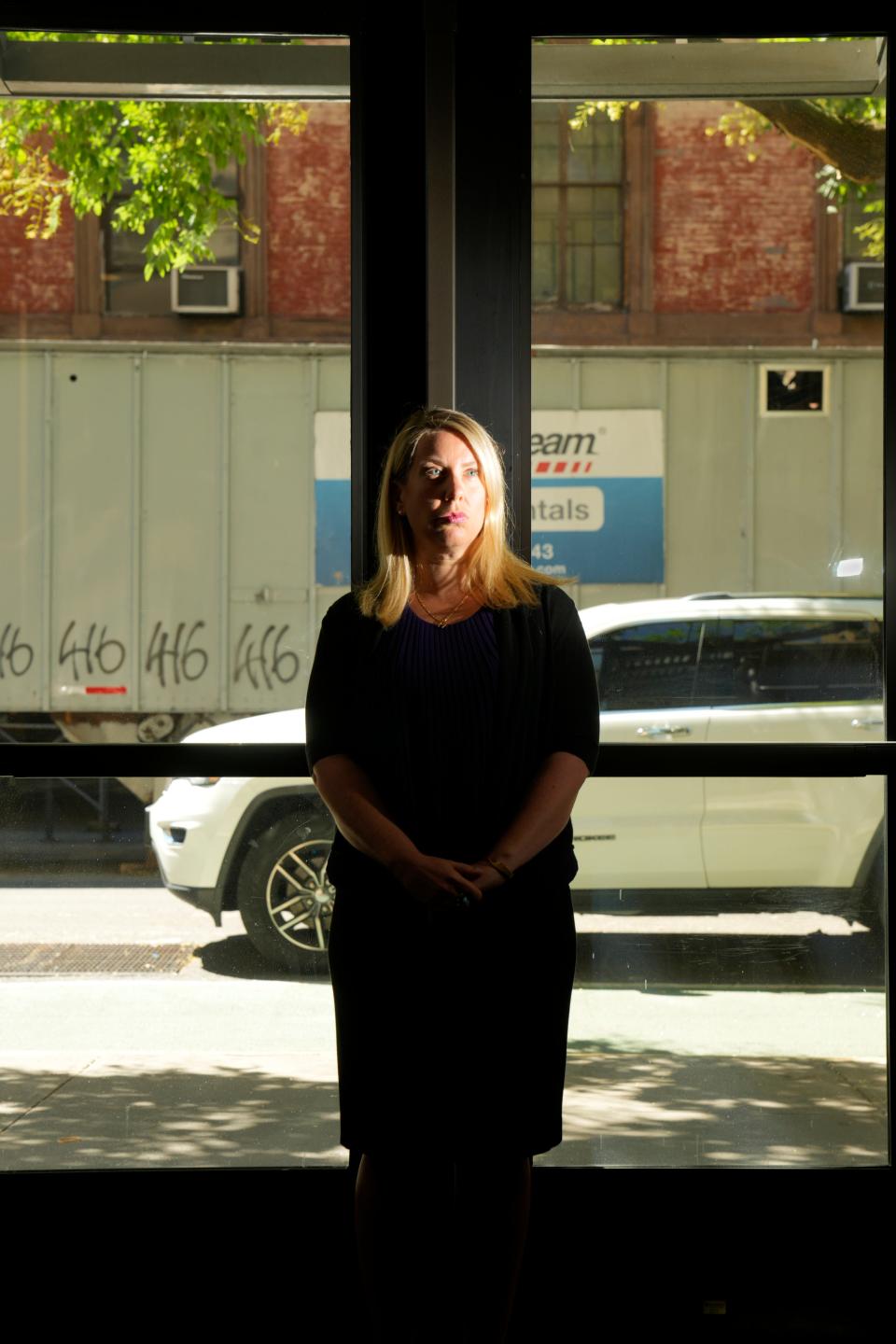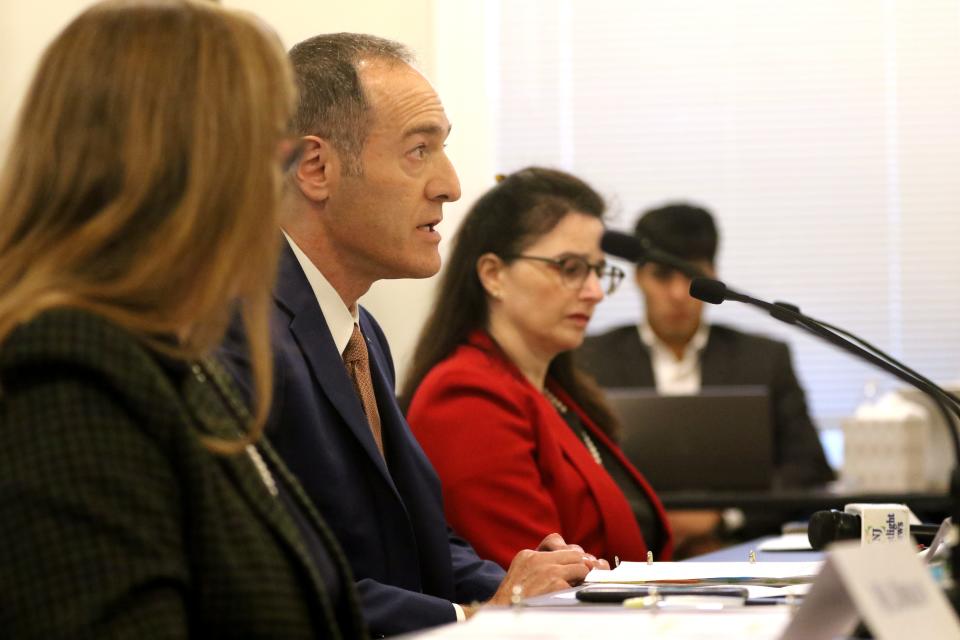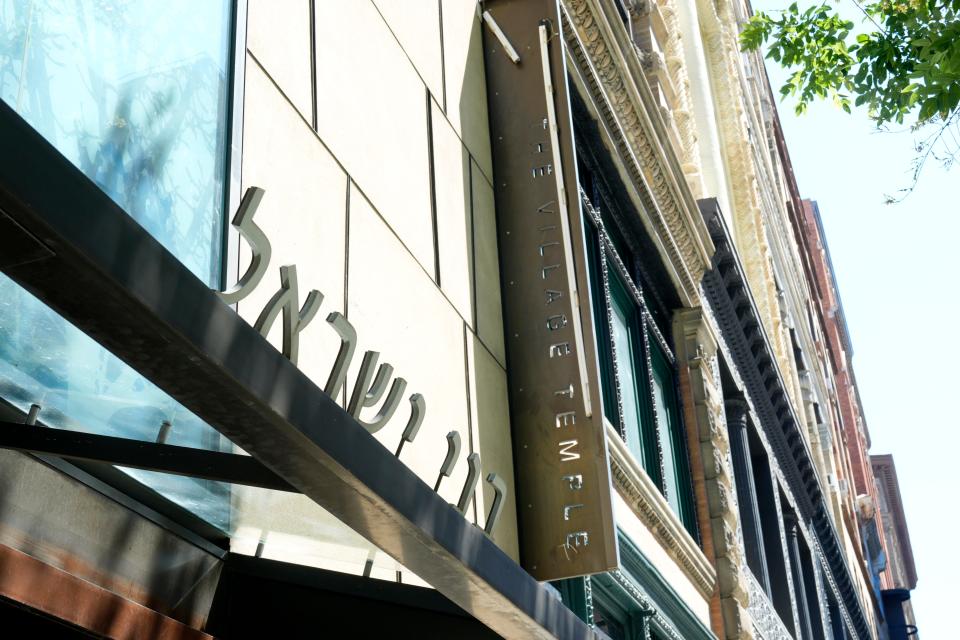Antisemitism is rising in NJ and across the U.S. Here's how to combat 'the oldest hatred'
- Oops!Something went wrong.Please try again later.
Omar Alkattoul was mesmerized by the antisemitic videos he found online, authorities say — and charmed by the friends he made there who bragged about ties to al-Qaida. The teenager from Sayreville pleaded guilty in July to posting an online threat that sparked a statewide warning to synagogues and other Jewish institutions in New Jersey.
Experts say his case offers a prime example of how social media has helped breed a record surge in antisemitic activity in the Garden State and beyond.
Online, Alkattoul's contacts introduced him to "Inspire," the English-language magazine produced by al-Qaida terrorists. They encouraged him to carry out violent attacks against Jews, blaming them for injustices visited on Muslims worldwide. Alkattoul pledged allegiance to Islamic State, another terror group, and researched mass shootings and how to obtain firearms, according to the U.S. Attorney's Office in Newark.
"I am the attacker and I would like to introduce myself," he wrote in the online manifesto that prompted the FBI warning last fall. He had "so many regrets," he said, "but I can assure you this attack is not one of them."

The 18-year-old was caught before he could carry out his threat. But others have been successful.
The list can feel endless: In January, a Molotov cocktail was thrown at the entrance of Temple Ner Tamid in Bloomfield; in February, two Jewish men were shot while exiting Los Angeles synagogues; in March, an Orthodox Jewish man was beaten up on a Queens street. In July, Democratic presidential candidate Robert F. Kennedy Jr. was criticized for peddling a conspiracy theory that the COVID virus was engineered to spare Ashkenazi Jews.
In August, a Pennsylvania man was sentenced to death for killing 11 people and wounding seven others in a shooting spree at a Pittsburgh temple in 2018, in the deadliest antisemitic attack in U.S. history.
The onslaught has left many Jews perplexed and numb, wondering what sparked the change in a country where they once felt safe. Scholars blame a combination of age-old provocations and new technology: political and economic unease, reckless rhetoric from politicians and celebrities, and social networks that give haters a forum to find one another and spread their venom.
Robert Bowers, the gunman found guilty in the Tree of Life Synagogue massacre in Pittsburgh, had an extensive history of posting, sharing and liking antisemitic and white supremacist material on Gab, a platform popular with the far right, prosecutors said.
In the past, extremists were often banned by radio, television and newspapers, "so they'd be pushed to the margins of society," said Scott Richman, regional director of the Anti-Defamation League's New York/New Jersey chapter. "Social media today is like a megaphone. You don't need permission to use it, and you can go viral."

Antisemitism rising — but no longer news?
The perpetrators of recent attacks were motivated by different forms of antisemitism, but what unites them is their belief that Jews are responsible for the problems ailing the world.
At this point, the rise of antisemitism in America has ceased to be surprising: It is apparent in harassment that Jews have faced on city streets, at college campuses and in synagogue pews. Last year, antisemitic incidents in the U.S. rose 36% to a record 3,697 incidents, according to the Anti-Defamation League. That was the highest number recorded since 1979, when the watchdog group began tracking such activity.
Jews make up less than 3% of the U.S. population but are the leading target of religiously motivated hate crimes, according to the FBI. Antisemitic activity accounted for 63% of all religiously motivated attacks last year, the agency said.
New York, California and New Jersey, the states with the highest numbers of antisemitic incidents according to the ADL's 2022 audit, are bearing the brunt of it.
The violence in recent years has left many American Jews feeling unsafe and has forced synagogues to boost security measures with cameras, stronger doors and armed guards. Many wonder what is causing the uptick and how they can stop it.
Scholars say antisemitism has historically reared its head during times of political and economic turmoil, when there's an urge to look for a scapegoat. Today, amid a war in Ukraine, economic instability and political polarization, the climate is ripe for the scourge.
‘Fighting with love:’ Jewish students stand up, push back against campus antisemitism
Forces on the political left blame those on the right for fueling the flames with their rhetoric, tracing the recent resurgence to former President Donald Trump. In August 2017, scores of neo-Nazis and far-right demonstrators marched in Charlottesville, Virginia, chanting such slogans as "Jews will not replace us." The rally, which drew counterprotesters, eventually turned violent. Shortly thereafter, Trump said there were "very fine people on both sides" of the event.
Last year, Trump had dinner at his Mar-a-Lago property with Kanye West, the rapper with a history of pushing antisemitic stereotypes, as well as Nick Fuentes, a prominent white supremacist and Holocaust denier.
In turn, those on the right frequently accuse progressive groups of spreading intolerance. They point to Democrats such as U.S. Rep. Ilhan Omar of Minnesota, who posted during the 2012 conflict between Israel and Hamas in Gaza that "Israel has hypnotized the world." She was criticized again in 2019 after she tweeted about a pro-Israel lobbying group that "It's all about the Benjamins baby," raising an age-old stereotype of Jews buying influence. A few weeks later, she derided Israel supporters for pushing U.S. lawmakers into "allegiance to a foreign country."
Omar issued an apology in 2019; Trump said in a social media post that Kanye had set up the dinner and that he didn't know Fuentes.
Yet the rise of antisemitism can't be pinned on any one political leader or ideology.
Called the "oldest hatred," it is a complex phenomenon dating back over 2,000 years. It has adapted with the changing times and can't be attributed to a particular dogma. The rising rancor has come from many sides.
"It's a shape-shifting type of hate. It's a clever, mutating virus that can affect anyone. That's what makes it difficult to fight," said Rabbi Diana Fersko, spiritual leader of the Village Temple in Lower Manhattan and author of the new book "We Need to Talk about Antisemitism."
In 2020, during protests in New York after George Floyd's murder, Fersko's temple was vandalized, its front door smashed in and glass shattered everywhere. "That was a transformational moment for me," she recalled. "Antisemitism is happening in liberal neighborhoods. It's becoming part of the culture in places where we never thought it would."
What is antisemitism?
Antisemitism isn't just hatred of Jewish people. It's a collection of conspiracies about Jews. It can manifest itself as anything from microaggressions — hidden as humor or ignorance — to violent acts, Fersko said.
What distinguishes antisemitism "is that it's not merely a social prejudice," Yair Rosenberg, a staff writer at The Atlantic, wrote last year. "It's a conspiracy theory about how the world operates." The mindset holds that Jews somehow control the world and are responsible for all of its problems, from diseases in the Middle Ages to California wildfires (the latter implied by Rep. Marjorie Taylor Greene in a 2018 Facebook post that she later deleted).
The rise of antisemitism "tells us more about what is happening in the larger culture than it does about the Jews," said Jonathan Sarna, a professor of American Jewish history at Brandeis University and author of "American Judaism: A History."
What's unique about antisemitism is that Jews experience it from white nationalists, left-wing groups and militant Islamists. "Those groups have nothing in common. But they all agree that Jews are at the root of their problems. If antisemitism were just from one group, it would be easier to deal with," Sarna said.
Ignorance also plays a role. A 2022 survey conducted by the American Jewish Committee found that nearly 31% of adult respondents said they were unsure of what "antisemitism" was or had never heard of it at all. That was still an improvement over the previous year, when 46% were unfamiliar with the term.
Are college curriculums a 'gateway drug'?
"Anti-Jewishness is a simple, off-the-shelf answer to almost any social aggrievement," said Earon Davis, a retired professor at Purdue Global and author of the newly released "Exposing Systems of Anti-Jewishness." "This is especially dangerous to Jews during times of polarization, when they are attacked from both the right and the left. During the 1930s, as now, Jews were attacked from the right as 'communists' and from the left as 'capitalist fascists.'"
The most dangerous threat today, he said, "is anti-Israel prejudice from the left, because it's a gateway drug for antisemites that many people, including Jews, tolerate. It employs many of the old historical antisemitic tropes about Jewish wealth and control of government, finance and media."
More: Subjected to antisemitism and racism, Jews of color feel 'stuck in the middle'
Avi Goldwasser, a filmmaker who co-founded the pro-Israel college campus advocacy group The David Project, attributes the rise in part to "a progressive curriculum that spreads false ideas about Jews, linking them to racism and calling them privileged, white and oppressors."
In fact, many Jews from around the world — including those from Yemen, Iraq and North Africa — are people of color "who have suffered from poverty and oppression," said Goldwasser, who recently co-published a book called "Betrayal: The Failure of American Jewish Leadership."
NJ a 'top-tier' state for white supremacists
New Jersey prides itself on being one of the most racially and culturally diverse states in the country, but it's also among the top for reported hate incidents. Last year, the Southern Poverty Law Center tracked 22 extremist groups in the state, including neo-Nazis.
White supremacist groups have increased their presence in New Jersey in recent years, according to the New Jersey Office of Homeland Security and Preparedness, which has rated the threat of white supremacist violence as "high" for the third consecutive year.
New Jersey is a "top tier" state and among "the most concerning places in the country when it comes to white supremacist activity, with 22 active hate groups," said Rachel Carroll Rivas, deputy research director at the Southern Poverty Law Center, which tracks extremist movements in the U.S.
In July, New Jersey Attorney General Matthew Platkin released a report, "Exposing White Supremacy in New Jersey," that examined the proliferation of recruitment and violence by such groups. The report describes the methods white supremacists use to blend into society — such as infiltrating government, law enforcement and school boards — to normalize their ideals.

The New Jersey European Heritage Association, for example, can easily be found through its tweets, website, and Gab and Facebook accounts, which describe a vehemently anti-minority, pro-white platform. The group regularly hands out paraphernalia and holds events. One of the latest was a July 1 rally in downtown Princeton where roughly a dozen participants in black shirts and khaki pants marched with Confederate flags; they distributed flyers lamenting the decline of the white race.
The same group previously showed up in Staten Island and in South Plainfield, according to media reports.
The makeup of extremist movements has evolved over the past few years. "Historically, young, working-class males were the standard demographic of such groups, but that has changed, and now we are seeing different types of people engaged," said Ben Popp, investigative researcher for the ADL's Center on Extremism. These groups try to attract attention and desensitize people to their imagery and messaging so they become normalized.
The New Jersey attorney general's report found that extremist groups often recruit young people by leveraging their insecurities. Youths who have experienced trauma or neglect, or who feel alienated, are particularly ripe targets for the groups, which offer a sense of belonging, according to experts cited in the report.
Combating hate by being 'Jewish-visible'
Anti-bias education is essential in the war against antisemitism and other forms of bigotry, experts say. "Ignorance is one of the greatest threats, because it makes people vulnerable to lies and misinformation," said Roz Rothstein, CEO of StandWithUs, an international organization that supports Israel and fights antisemitism through its educational programming. It is also imperative for young people to learn about the Holocaust and how bigotry can transform into terrorism.
Richman, of the ADL, said it's important to speak out against all forms of hate speech and to report incidents of antisemitism to his organization and local law enforcement.
In Princeton, residents responded to the white supremacist groups marching through town by heckling them and crumpling up their flyers. They also held their own counter-rally, a "Pop Up Love Fest." Roughly two dozen participants gathered at the center of town to raise rainbow flags, Black Lives Matter posters and other emblems of love and justice.
Platkin, the attorney general, said residents need to fight white supremacy and "eradicate hate, bias and extremism in New Jersey" by recognizing the risks for and signs of radicalization. They must come to the aid of young people so that they can avoid falling into the trap of recruitment, he said in his July report.

Fersko tells worshippers at her temple to fight antisemitism by being "Jewish-visible."
She urges them to "show up as a Jew in public, to wear a Jewish star or a kippah. If events are regularly scheduled on a Saturday, tell people it's on our Shabbat. We need to show up as Jewish not just in the home but in our public places, where people can know who we are in a more authentic way.
"The gay community has done a beautiful job of building allies and awareness," she continued. "We need to claim our identity and create empathy, too, and make people sensitive to who we are."
If not, Fersko said, it means the future of American Jewry is more fragile than it has ever been.
"It means that the antisemites win," she said.
Deena Yellin covers religion for NorthJersey.com. For unlimited access to her work covering how the spiritual intersects with our daily lives, please subscribe or activate your digital account today.
Email: yellin@northjersey.com
Twitter: @deenayellin
This article originally appeared on NorthJersey.com: Antisemitism isn't just an NJ problem. On fighting the 'oldest hatred'

